PHILADELPHIA (RNS) — In a city known as the cradle of American democracy, an impassioned, hourslong protest dubbed “No Kings Nationwide Day of Defiance” filled the streets around the Philadelphia Museum of Art on Saturday (June 14). It was the flagship demonstration of more than 2,000 similar protests organized across the U.S. against President Donald Trump.
Organized by the advocacy group Indivisible and a number of partnering organizations, the protest included religious attendees and speakers — most notably activist and Yale Divinity School professor the Rev. William Barber II — spanning the spectrum from the Buddhist Coalition for Democracy to Mennonite Action.
A column of tens of thousands of demonstrators marched toward the museum on Saturday morning, waving signs and shouting slogans condemning Trump’s ongoing immigration crackdown and his decision to dispatch the National Guard and U.S. Marines to quell immigration protests in Los Angeles.
But as the crowd neared the museum, Barber, the first speaker, called them to near silence. He urged the throng to pause to recall the shootings of two Democratic lawmakers in Minnesota earlier that morning, one of whom was killed alongside her spouse.
“My faith, in times like these, says to be still and know that God is a very present help in the time of trouble,” Barber told the crowd, occasionally lifting a towel to his brow to wipe away a drizzling rain. “My faith calls us — and the faith of many others — to embrace love and to rebuke hate, to rebuke fear, to rebuke death. So let us do that together in this place, in Philadelphia.”
Later in his remarks, Barber contrasted Philadelphia’s role in the American Revolution with Trump’s decision to host a widely criticized military parade in Washington later in the day, an act the preacher likened to parades organized by dictators such as North Korea’s Kim Jong Un.
“Everyday people had linked up with everyday people in other colonies to declare their independence from tyrannical rule,” Barber said. “Two and a half centuries later, a would-be king has ordered U.S. troops to occupy Los Angeles and to parade down the streets of Washington, D.C.”
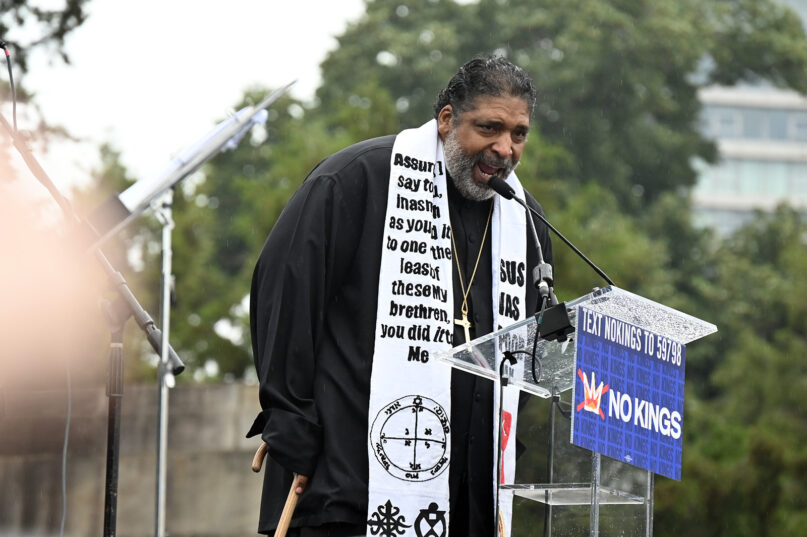
The Rev. William Barber II addresses a “No Kings” protest, June 14, 2025, in Philadelphia. (RNS photo/Jack Jenkins)
He added, “We are everyday people of every race, creed and community and political affiliation, uniting in the great nonviolent tradition of those who came before us to demonstrate a better way.”
Milling about the crowd as Barber spoke were demonstrators who framed their protest in terms of their faith. Don O’Neill, a Philadelphia native, held a sign that read: “Jesus is my king! Trump? Never ever.” An evangelical Christian, O’Neill said his faith compels him to oppose Trump, whom he described as a “satanical” figure. “I have read the Bible recently, and everything I read in there, he is doing the opposite of,” O’Neill said of the president.
O’Neill said he was disappointed in his fellow evangelicals’ long-standing support of Trump at the ballot box, adding that he had recently left a church because members there were too uncritically supportive of the president.
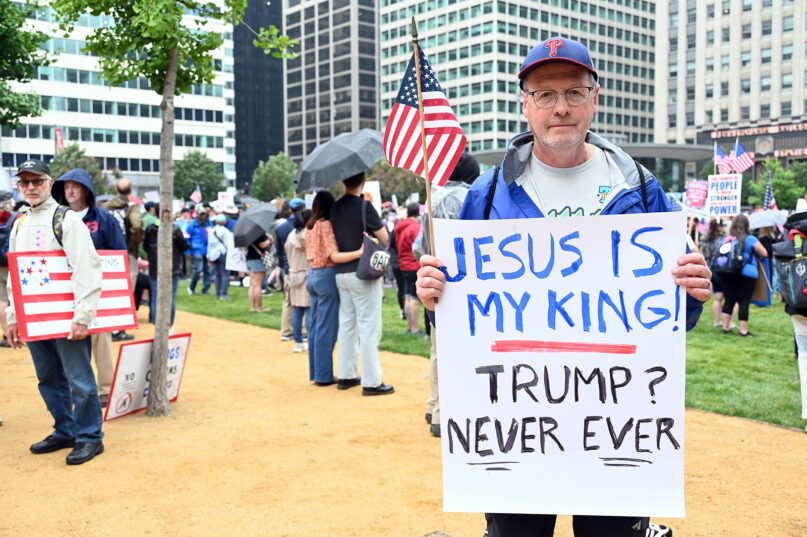
Don O’Neill attends a “No Kings” protest, June 14, 2025, in Philadelphia. (RNS photo/Jack Jenkins)
“They were more aligned with the political party and Trump than they were with Jesus and the Bible,” O’Neill said. “So very disturbing.”
Down the street, Matt Coyne, a Catholic deacon, paused to have his picture taken in front of a giant inflatable golden calf made to resemble Donald Trump. The calf, created by the group Faithful America, was flanked by signs that read “No Kings! No Idols!”
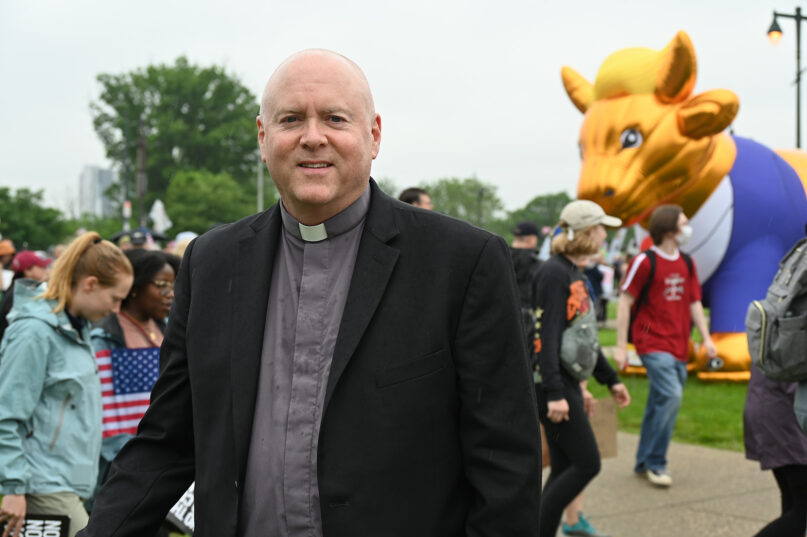
Matt Coyne at a “No Kings” protest, June 14, 2025, in Philadelphia. (RNS photo/Jack Jenkins)
Coyne said he had finished a deacon ordination service in Philadelphia’s Center City when he saw marchers walk by. Inspired, he and other deacons decided to join in.
Asked why he was participating, Coyne replied: “Jesus said: Love your neighbor. Simple as that.” He said several people in the crowd had already approached him seeking pastoral care.
“I don’t know if we’re going to change the world, but it’s going to help a lot of people who just wanted to say: I don’t like what I see,” Coyne said.
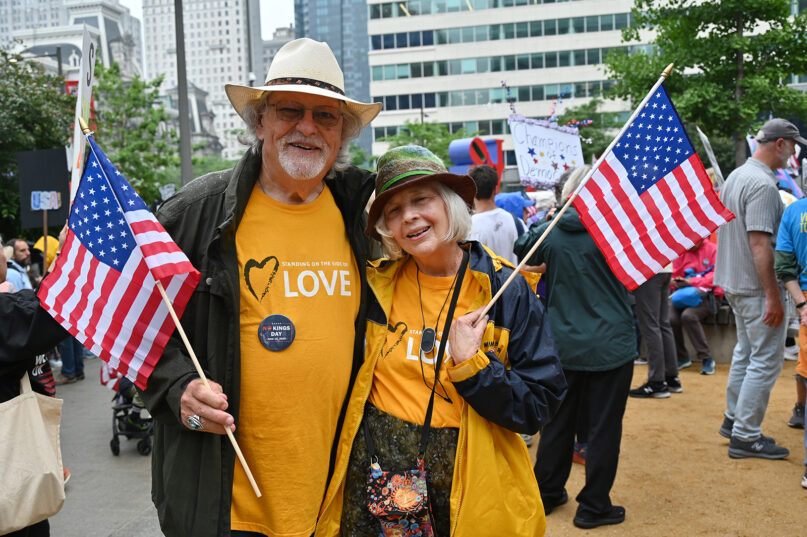
Craig and Linda Farr attend a “No Kings” protest, June 14, 2025, in Philadelphia. (RNS photo/Jack Jenkins)
Wearing yellow shirts reading “Standing on the Side of Love,” Craig and Linda Farr, both Unitarian Universalists, said they were urged to attend the protest by their pastor.
“I’d rather be here than watching tanks,” Craig Farr said.
Asked whether their religious beliefs informed their protest, Linda Farr noted her tradition’s sense of the “inherent worth and dignity” of every person, along with “justice, equality and solidarity.”
The Rev. Paul Brandeis Raushenbush, a Baptist minister who heads Interfaith Alliance, a Washington nonprofit, and a member of the No Kings steering committee, said he had helped organizers reach out to religious constituencies who were already vocally critical of the president.
“People wanted to be a part of it,” Raushenbush said, as speakers addressed the crowd behind him.
Raushenbush said liberal-leaning organizations such as Indivisible are “recognizing the power of religion — not only the moral power, but also the vision that religion brings.” Indivisible’s co-founder, Ezra Levin, spoke at a Moral Monday protest organized by Barber earlier this month, and groups such as Interfaith Alliance, Raushenbush argued, were a natural fit for a “No Kings” protest.
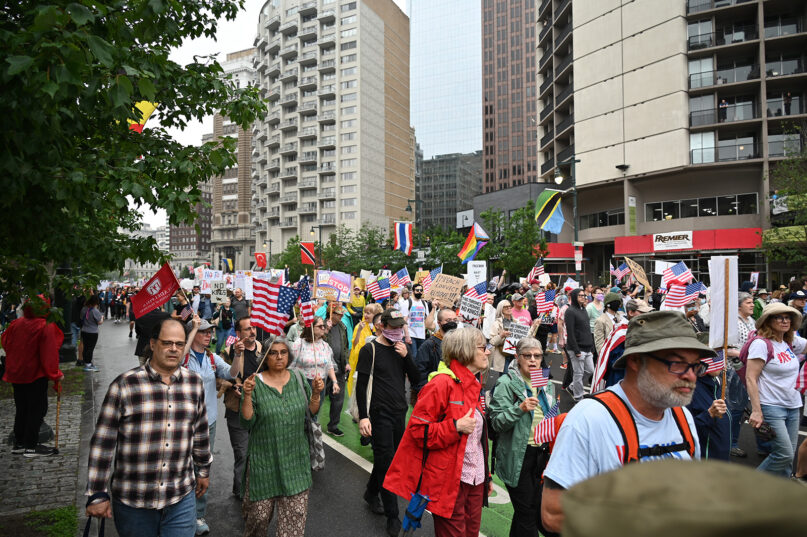
People participate in a “No Kings” protest, June 14, 2025, in Philadelphia. (RNS photo/Jack Jenkins)
“Religion thrives in democracy — not in a dictatorship, not in autocracy,” Raushenbush said. “In dictatorships, only when you bend the knee do you survive. In American democracy, religion has thrived because we don’t have kings … and democracy does not demand that you bend your knee.”
Sitting on the grass nearby were Olivia Wright and Laura Avellino, whose signs read, “Not a paid protester, I hate Trump for free” and “Jews for a free Palestine.”
Avellino was one of several pro-Palestine protesters in the crowd, some of whom were affiliated with the activist group Jewish Voice for Peace. Avellino accused Trump of “plunging toward fascism” and criticized his relationship with Israel amid the ongoing Israel-Hamas war.
“That’s a big issue for me, especially as a Jewish person,” Avellino said. “I feel like the actions of Israel are also causing a lot of antisemitism, and the genocide as well is just horrible.”
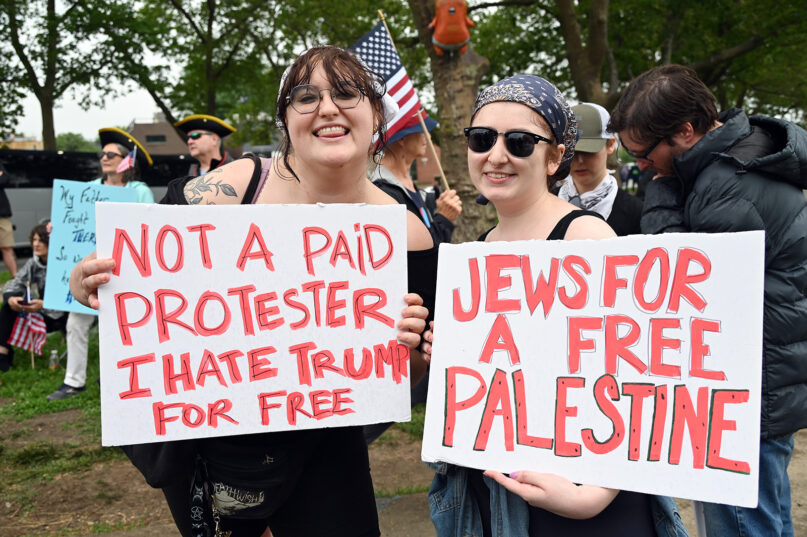
Olivia Wright, left, and Laura Avellino demonstrate during a “No Kings” protest, June 14, 2025, in Philadelphia. (RNS photo/Jack Jenkins)
Avellino and Wright, like several in the crowd, worried that Trump and administration allies would depict the protest as violent, as he has the Los Angeles demonstrations against mass deportations.
The Rev. Jeremy O’Neill, in attendance with his fellow Episcopal priest the Rev. Luke Selles, said: “It’s frustrating to sometimes see these sort of events projected as disorganized or violent or chaotic, but this is so well organized. This is what community looks like.”
The pair said they felt spurred to demonstrate due to a mixture of “rage” and “compassion.”
O’Neill appeared vexed by Christians who have invoked Christian nationalism while supporting the president and his immigration policies. “We’re tasked to preach the gospel, which tells us to welcome the stranger,” O’Neill said. “There are so many in this country who claim that this is a Christian nation … and I would just hope that we could stand for welcoming all people.”
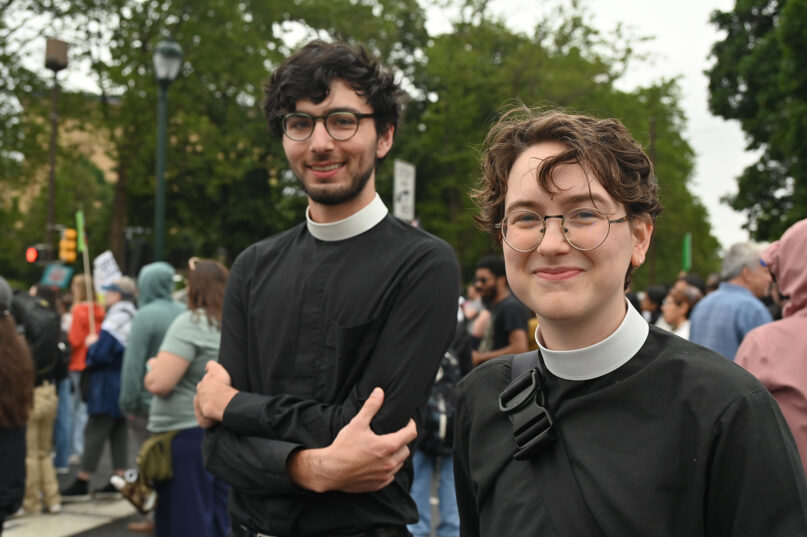
The Revs. Jeremy O’Neill and Luke Selles attend a “No Kings” protest, June 14, 2025, in Philadelphia. (RNS photo/Jack Jenkins)
O’Neill added: “Jesus flipped over tables when he was upset with what was going on.”
Most who spoke to Religion News Service were skeptical whether the protest would bring change to the administration’s approach to governing. But Selles, who works at the Church of St. Martin-in-the-Fields in Philadelphia, said that regardless of its power to shift policy, the protest may energize some and give hope to others for a more empathetic future.
“As a young person, I felt very disillusioned with the government,” Selles said. “But I also feel like we have so much as a nation that we can be — we can be better than we are.”







